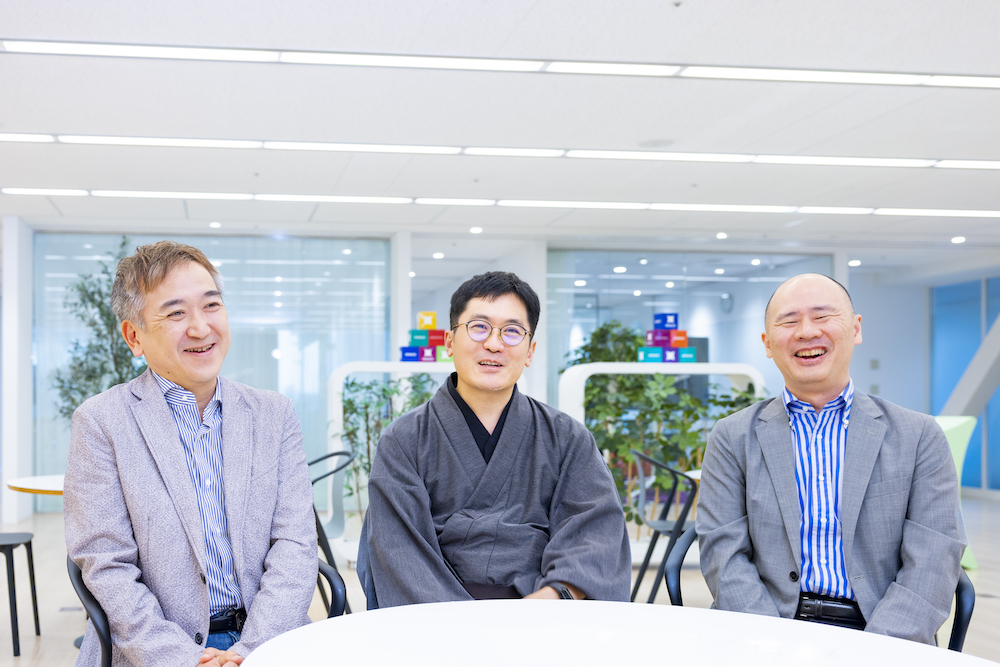
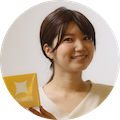
MASAKO YANO
Published on Aug 1, 2023
Three years from now, 2026, HENNGE will celebrate its 30th anniversary. This time, the three founding members sit down to talk about the background of the company’s founding, the evolution of its products, its unique vision and the culture that is not afraid of change and failure, and the human resources image that they are looking for today.
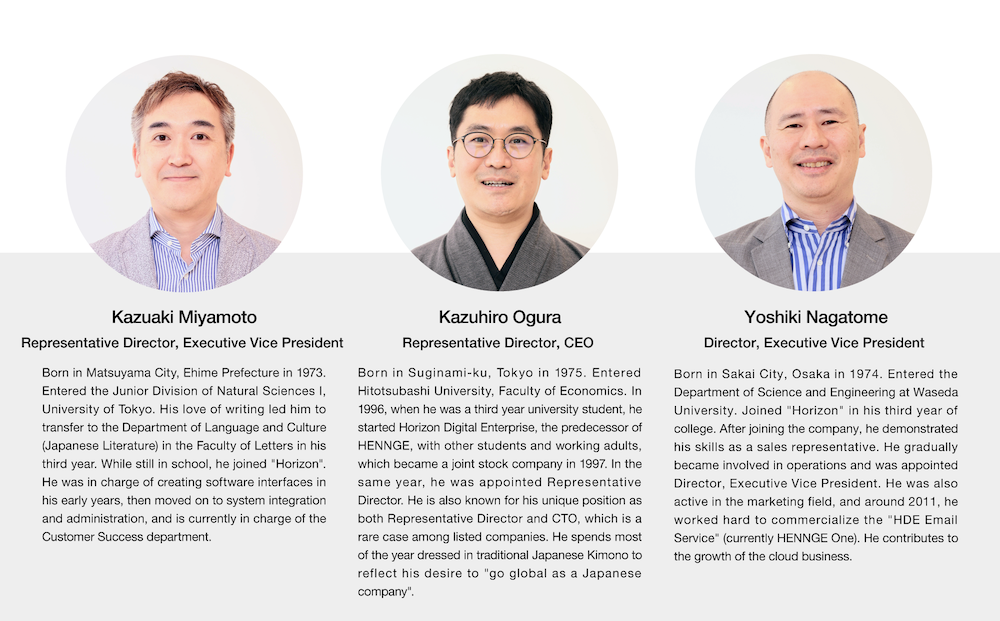
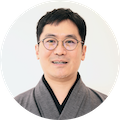
I spent my childhood immersing myself in programming on the “MSX” computer that my father bought me instead of the Famicom. When I became a high school student, I buried my computer in the garden and enjoyed my youth by playing in bands and other activities in order to become more popular, but in the end I was not very popular (laughs). However, while I was preparing for the university entrance examination, I was shocked by the evolution of computers I saw in the Akihabara electronics district, and I became interested in computers again.
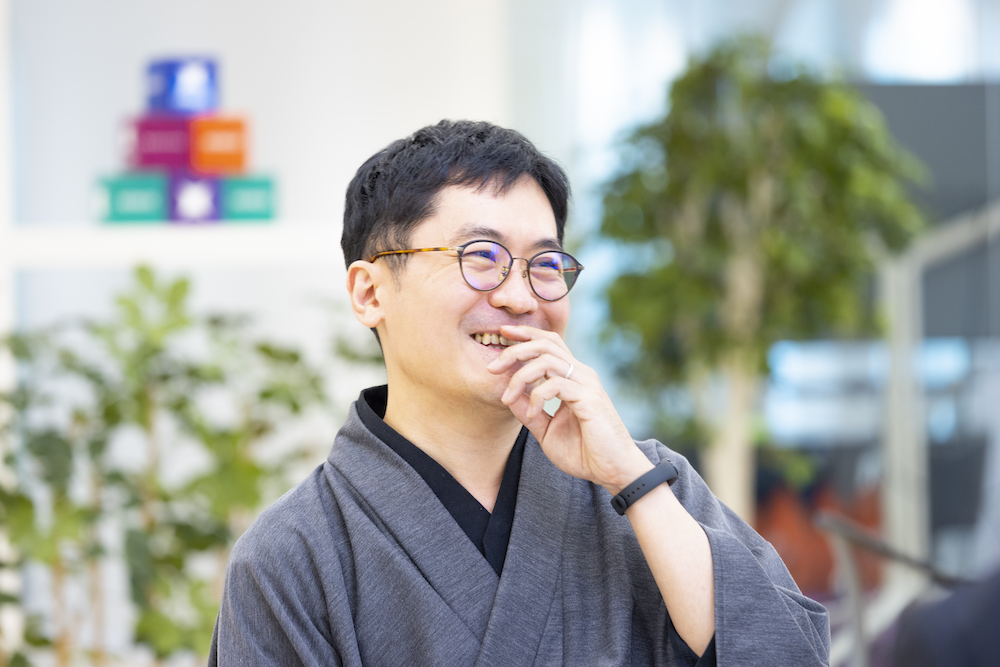
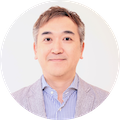
My parents both worked, so I was a grandmother’s child. I had a peaceful childhood, visiting the 88 temples of Shikoku with my grandmother and reciting the Heart Sutra at the age of three. In junior high school, I got a word-processing machine, and in high school, I became fascinated with “PC communication services,” which my father taught me. I entered university as a science major, but switched to the humanities in my third year. I remember I was so absorbed in a student theater company that I had to repeat a year and my parents stopped sending money to me (laughs).
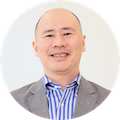
I was bought an MSX, a personal computer for beginners, when I was in the fourth grade, and I became absorbed in game programming. In high school, I entered one of the best preparatory schools in Osaka Prefecture, but I realized that I could not be number 1 in my studies, so I immersed myself in the activities of the Shorinji Kempo club. Although I learned the basics of programming at university, I found out that I preferred meeting and talking with people. I had a strong sense of curiosity and traveled alone to places such as Europe.
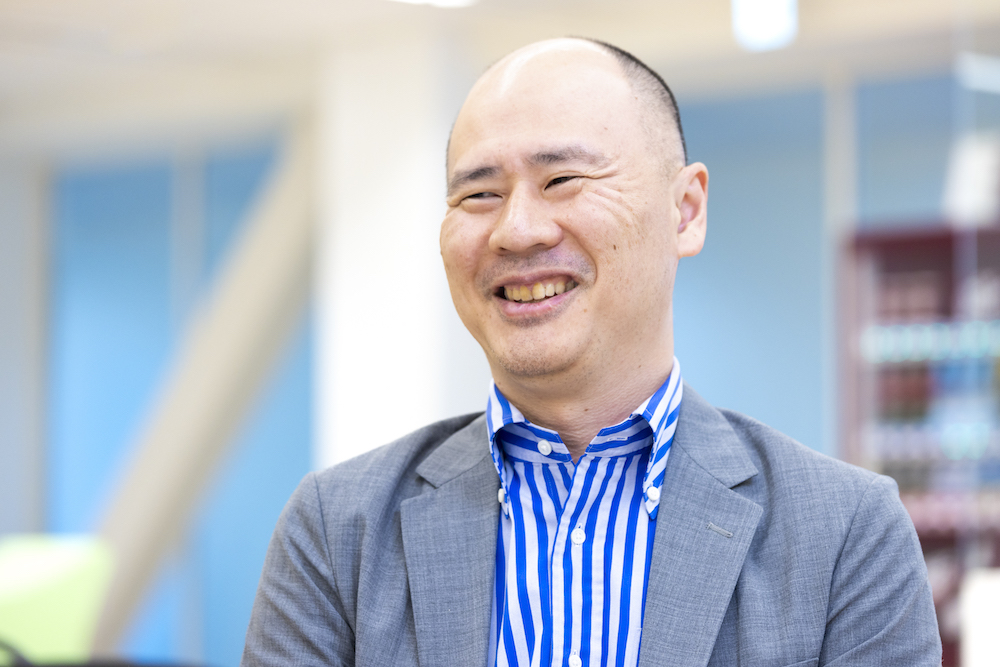

So how did the three of you meet in the first place?

When I was a university student, I worked part-time as a programmer. That time, I had a contractor connect the computer at my part-time job to a network, and I realized the potential of this business, thinking that I could do it more cheaply. In 1996, when I was in my junior year, a group of students and working adults got together to start “Horizon Digital Enterprise” (the predecessor of HENNGE). At first, we were a handyman that offered computer tutoring, web production, and moving computers.

Since my allowance had been cut off, I started working at Horizon Digital Enterprises, which was looking for part-time computer tutors at the time. After talking with Ogura-san and others, I became fascinated by the possibilities of the Internet. I was happy to see the customers in front of me being happy, and the process of creating a product and turning it into a company was also interesting.

I was also in my third year of college when I saw the flier for the part-time job. At the time, part-time jobs utilizing computer technology were rare, so I was surprised by the activities of Ogura and his colleagues. Although my university department was Science and Engineering , I wanted to do something different from my major, so I became passionate about sales and marketing. I was attracted to Ogura-san and his team’s broad perspective, and decided to work with them.
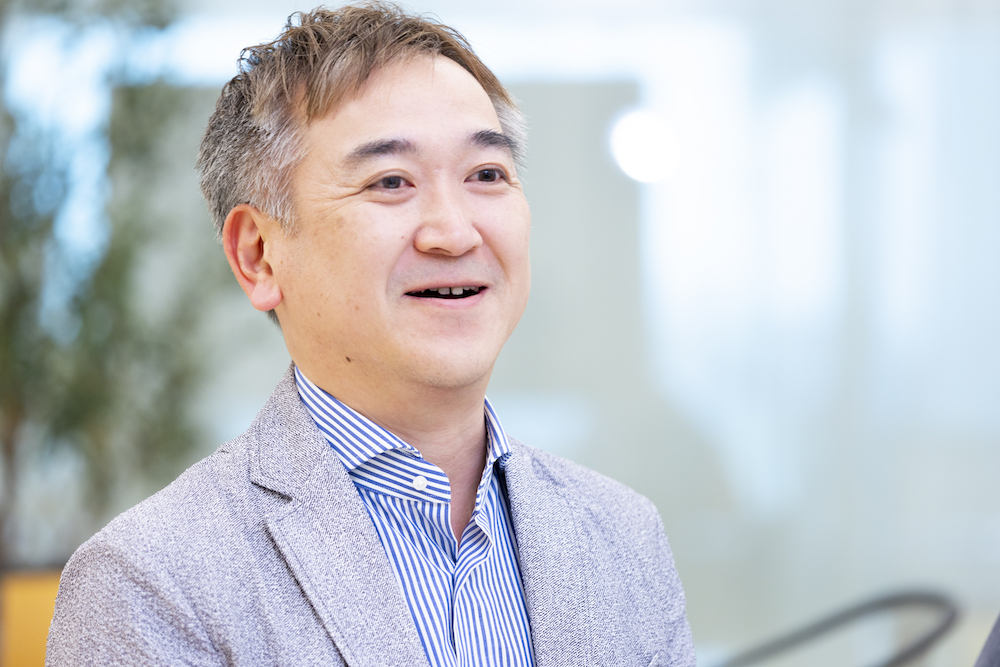

What was your first product after the company was founded?

This is the Linux () server management tool that we launched in 1997. Anyone could connect to the Internet using the then newly released Linux OS, so we went to companies to sell it to them, saying, “You can connect to the Internet at a low cost, have a homepage, and communicate with customers via email.” () Linus is a type of operating system (OS), similar to WIndows 10 and MacOS, and is mainly used as a server operating system
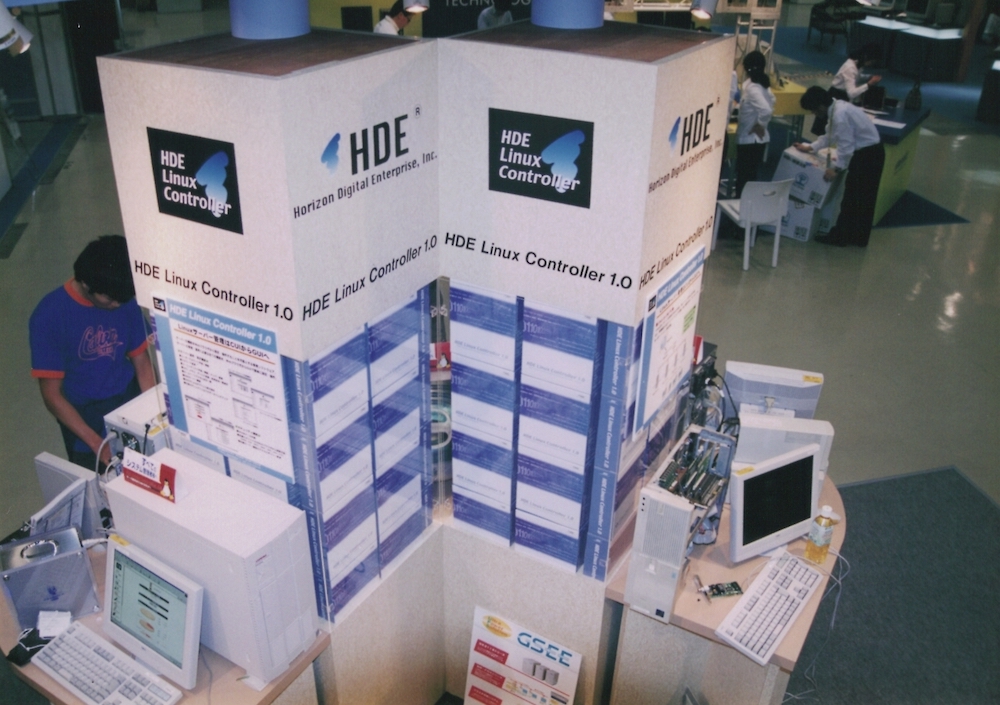

At the time, customers were in the mood to invest in IT, and this product sold quite well.

On the other hand, some customers said it was too technical and difficult to use, and we began to feel a gap between engineers and customers. Without someone to bridge the usability gap, even if innovations are created, they will not reach the customer in the end, and that is not good enough. That is why we have set “Liberation of Technology” as our management philosophy. We will contribute to society by continuing our efforts to fill the gap. This is our renewed determination.
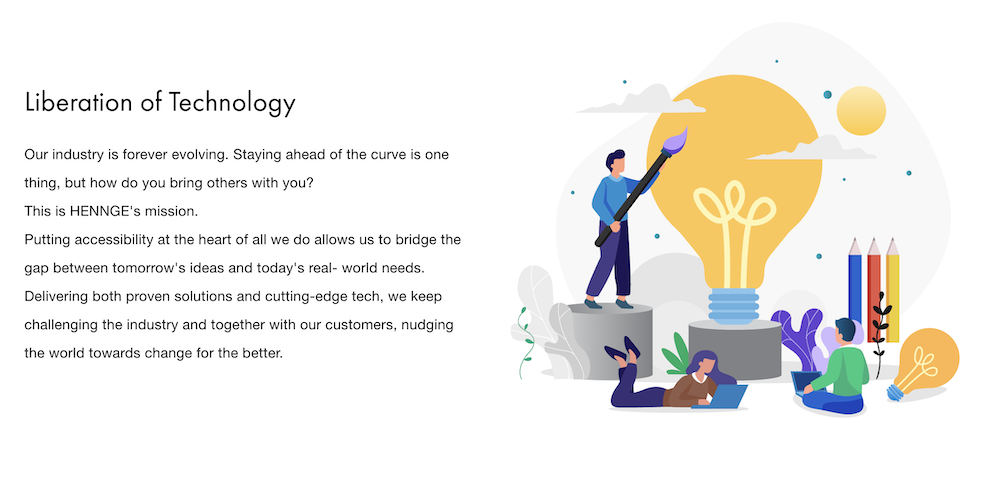

So this is how HENNGE’s vision “To change the world through the Liberation of Technology ” was born. You experienced the IT bubble after that. What was the atmosphere like then?

We came to Shibuya in 1998. At first, our company was small and we used to get free eggs and fried chicken from a neighborhood bento shop (laugh). Soon after that, following Silicon Valley in the United States, Shibuya came to be called “bitter valley” (Shibuya – 渋谷;渋い bitter; 谷: valley). It was right in the middle of the IT bubble. People wanted to invest in the area, and the atmosphere changed.
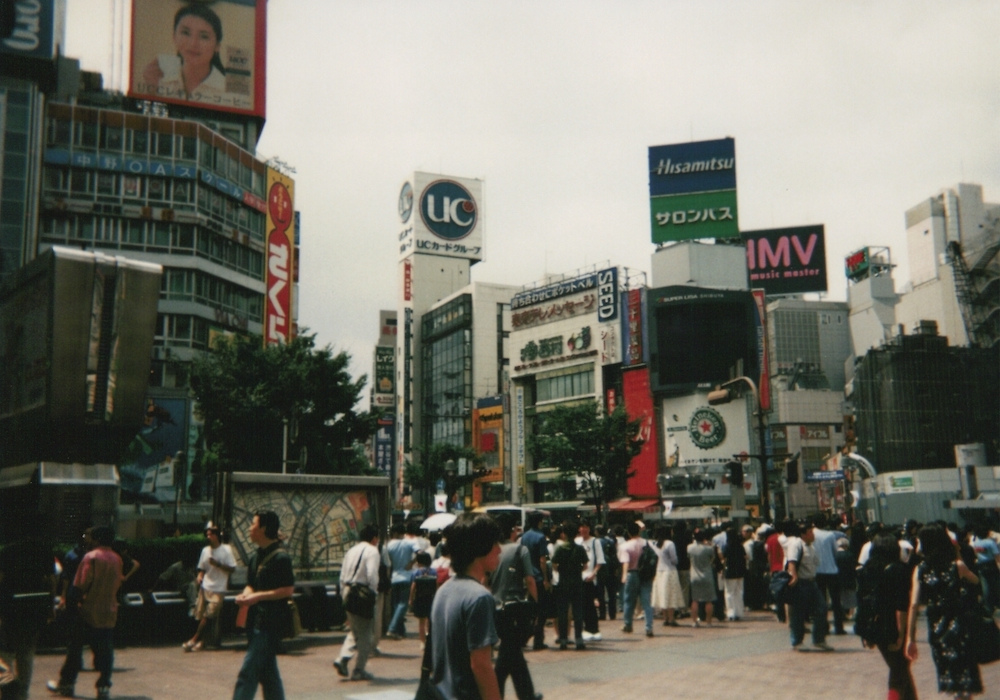

Around 2000, we received several hundred million yen in investment from venture capitalists, and our sales grew rapidly in line with this investment.

However, that enthusiasm and surge came to an abrupt end with the bursting of the bubble economy. The company nearly went bankrupt around 2002.

How did you recover after almost going bankrupt due to the IT bubble burst?

Originally, we were selling Linux server management tools, so we launched an email business in 2000, which is compatible with Linux. The technology for delivering large volumes of email was difficult back then, so the business was doing quite well.

The email delivery system was in great demand, especially in the financial industry. We have had people use it for purposes such as email sent when withdrawing money from a bank ATM.
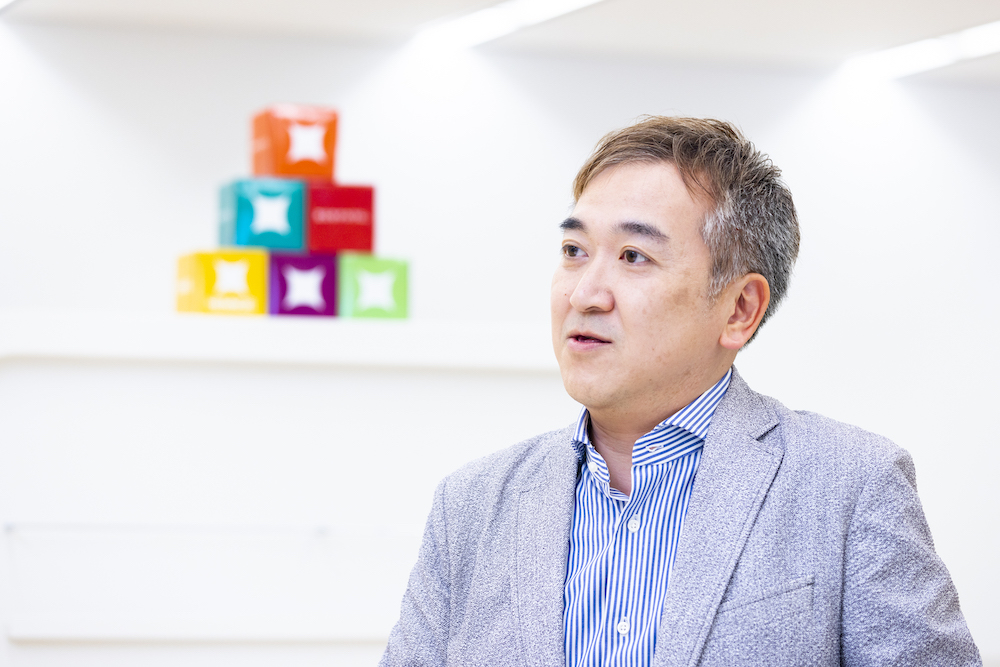

What was the impact of the Lehman Shock in 2008?

Due to the Lehman shock, the financial industry, including banks, insurance companies, and securities firms, stopped buying things all together.

At that time, SEs from various companies lost their jobs and had to stay at home. This led to a trend among distributors to stop procuring software from other companies, and instead, develop full-scratch systems from scratch using their own available SEs. As a result, this caused our packaged software to lose sales. We were once again on the verge of bankruptcy.

Looking back, I think that this was a time when we forgot about changes. As we were concentrating on “company building” in order to steer the company to a more grounded management, I feel that our desire to do something new has become somewhat neglected.
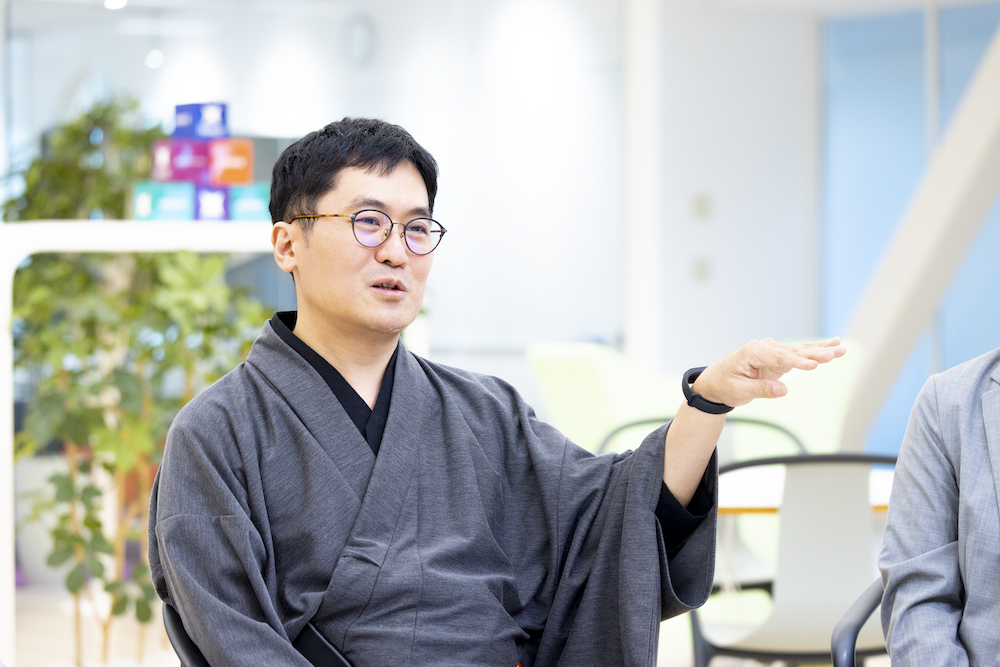

There was no major direction for doing something new, but on the other hand, there were a few comments here and there that it would be better to do cloud computing as well.

So that was where your main product, the Cloud Security Service “HENNGE One”, was born, right?
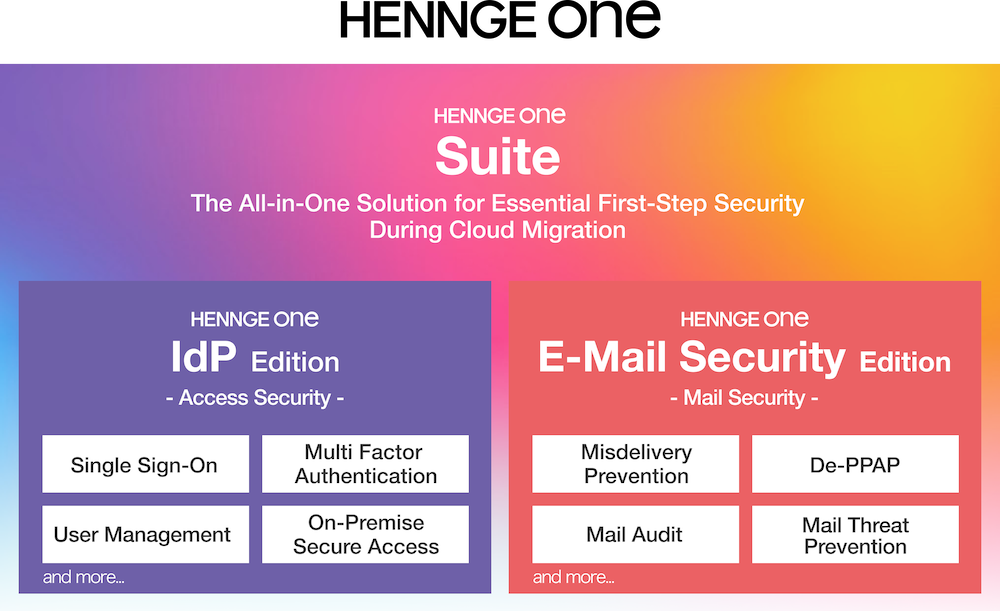

In the spring of 2011, the Great East Japan Earthquake struck, and cloud computing came to attract attention, that was also when our mindset as a company rapidly changed. The emergence of cloud technology was a major turning point in our current business.

Thanks to the timing at that moment, everyone suddenly started using the cloud after the Great East Japan Earthquake. I don’t think we would have been able to respond afterwards if the changes in the external environment had already happened. We were quite lucky because we got off to a head start. Until the earthquake, the cloud was still an unknown concept, and we were told that it was not yet ready to be used.

We introduced the cloud security service “HDE Mail Service” (currently “HENNGE One”), which we had been developing, to fill in the big gap that appeared in front of us, where people could not come to the office and had to work from home. If we hadn’t anticipated the changes, we wouldn’t have been able to achieve it. Thanks to this, our product has been highly evaluated in the cloud security field to this day.

From 2016, the company’s Englishnization, making English the official language of the company, was enforced. What was the reason behind this initiative?

First of all, at that time, social game companies were hiring domestic engineers at very high salaries. It was right around the time when smartphones were beginning to spread. We struggled a lot with recruitment.
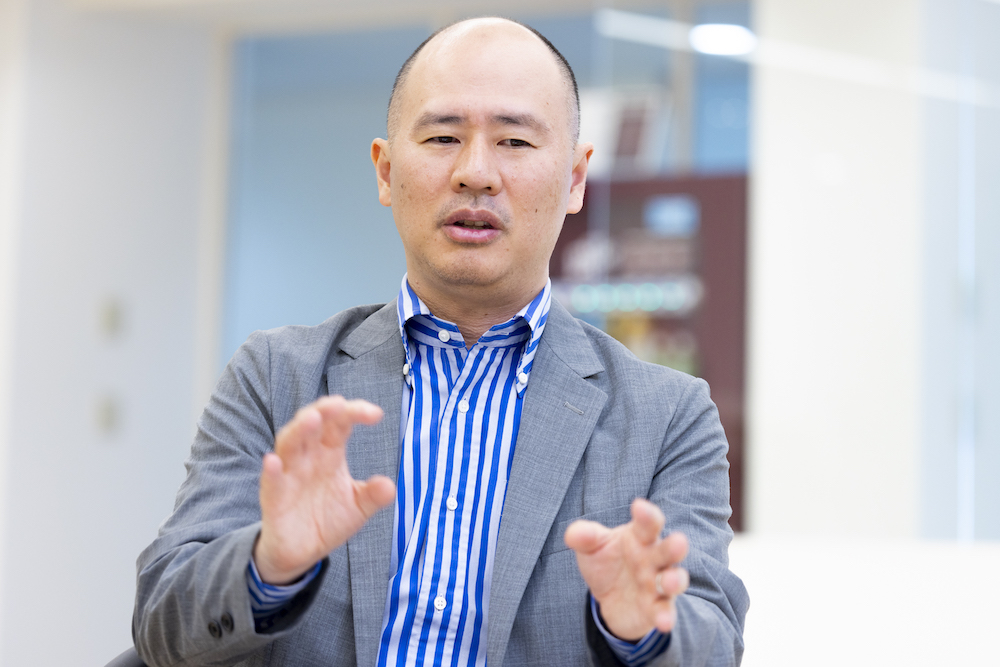

During our discussions, we asked ourselves, “Is it necessary to hire domestically in the first place?”. We decided that we did not need to be concerned about engineers who could speak Japanese. Thus, we decided to begin hiring overseas. In fact, many excellent people came to us. What surprised me was that there were more people who wanted to work in Japan and in Tokyo than we had imagined. This was a happy miscalculation.

Many members, including engineers, came from more than 22 countries and regions (as of the end of September 2022), including countries with large populations such as the United States, China, and Indonesia, as well as Europe, Africa, and Australia.
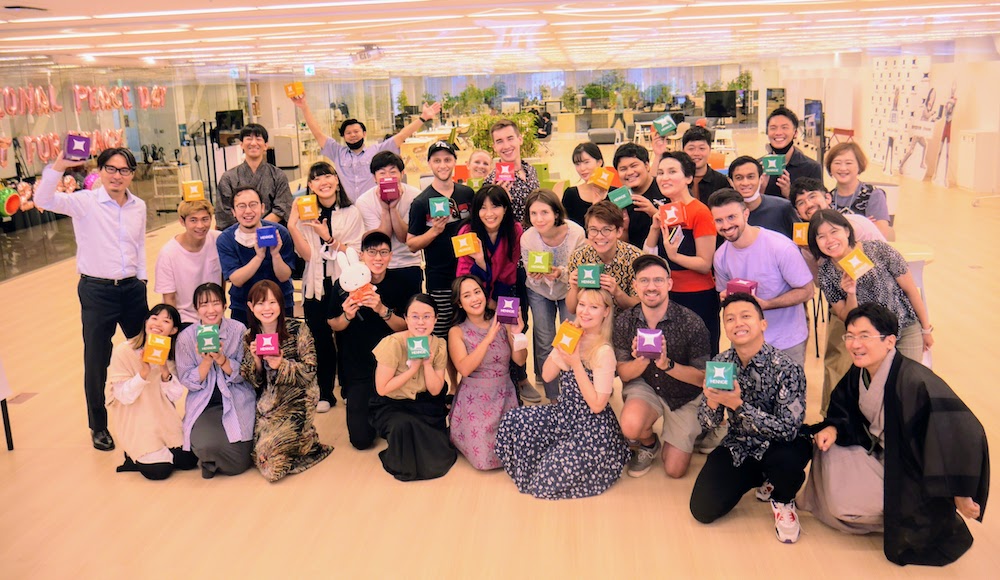

Although it is commonplace in any company nowadays, we were one of the first to set up a Muslim prayer room in the company. We quickly created an environment in which it was natural to have a variety of people.

I realized that the variety of people that we have is also a special value. As the diverse values spread throughout the company, it became natural to have people of various backgrounds in the company, and the atmosphere also changed. We used to think that we had a culture that tolerated failure, but in reality, we were rather a uniform organization. When there are people with diverse values, various failures and challenges are likely to occur. Making English the official language of our company has also become an engine for diversity and change.

Speaking of a culture that tolerates failure, HENNGE has the value “Eat unripe fruits and make mistakes early” to remain an early adopter, right?

In order to realize HENNGE’s vision of “Liberation of Technology,” we ourselves need to actively consume new technologies, which are immature fruits, and sometimes have a bad stomach ache, to deliver the useful fruits to our customers.In order to deliver new value to our customers, we believe it is important to first generate new ideas by interacting with other HENNGE members, and to take on many challenges and failures.
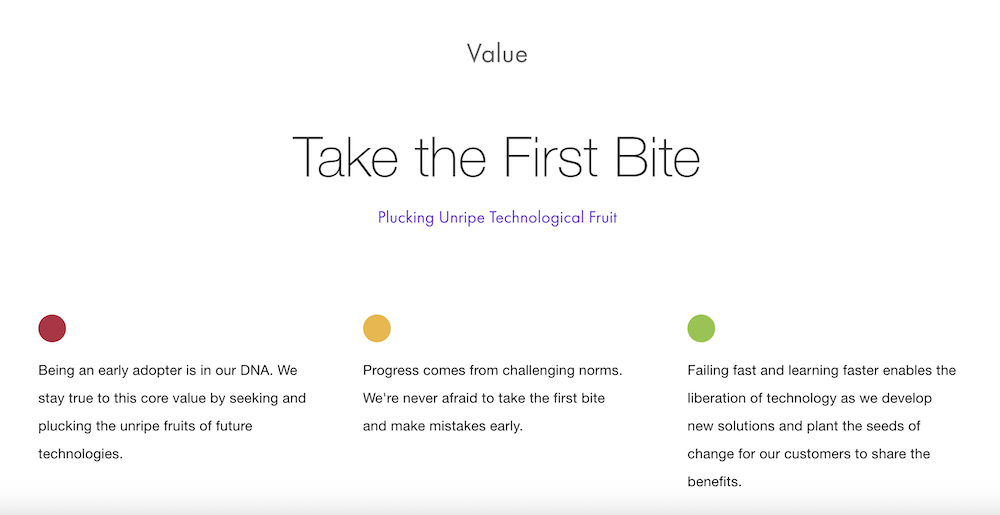

How do you create a culture that allows for failure? I think some people are worried about how far they can challenge themselves.

We, ourselves, fail a lot everyday. It could be said that the number of failures is exactly the number of challenges.

Right. I think the flip side of failure is the intense lesson learnt. If you carefully think things through before taking on a challenge, there are many things you can learn even if you fail. Rather than asking our employees not to fail, we are a company that asks ourselves whether we have done our research passionately, and whether our failures have become learning experiences.
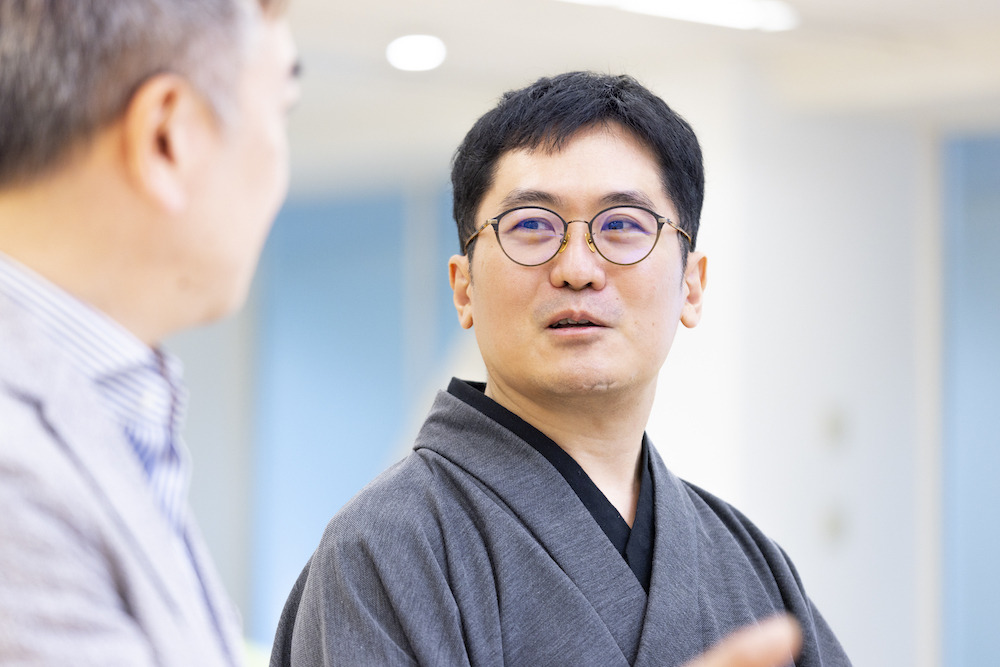

The company name was changed to “HENNGE” in 2019 because of your determination to continue taking on challenges. Is that right?

If “HENKA” (change) becomes the norm, we can overcome whatever happens. Because we are living in such a turbulent era, we will want to take on and challenge all kinds of “HENKA” (change). That is why we changed our company name to “HENNGE”. This is also a name that expresses our dream to excite the world as a Japanese-born IT company.

I see that “HENNGE” is a combination of “HENka” (change) and “challenGE”. What are the strengths and weaknesses of such “HENNGE”?

The organization of “HENNGE” is similar to jazz, which is characterized by improvisational performances. It is like playing a quick melody by improvisation without sticking to the notes in the score. Originally, we were a group of students, so there was a jazz-like atmosphere, but halfway through, it became like an orchestra where everyone moved according to the instructions of the conductor. But this actually didn’t work well. Now that the number of employees has increased, it is a difficult task to figure out how to play jazz with this number of people in an orchestra, but as a member of management, I would like to take on this challenge somehow.

I think it is a good thing that we have such diversity. It is very interesting to be able to satisfy my intellectual curiosity in my daily work, such as having simulated experiences like wandering around the world while doing work at the company, eating food from various countries at in-house lunch events, and hearing about countries that I have never visited.
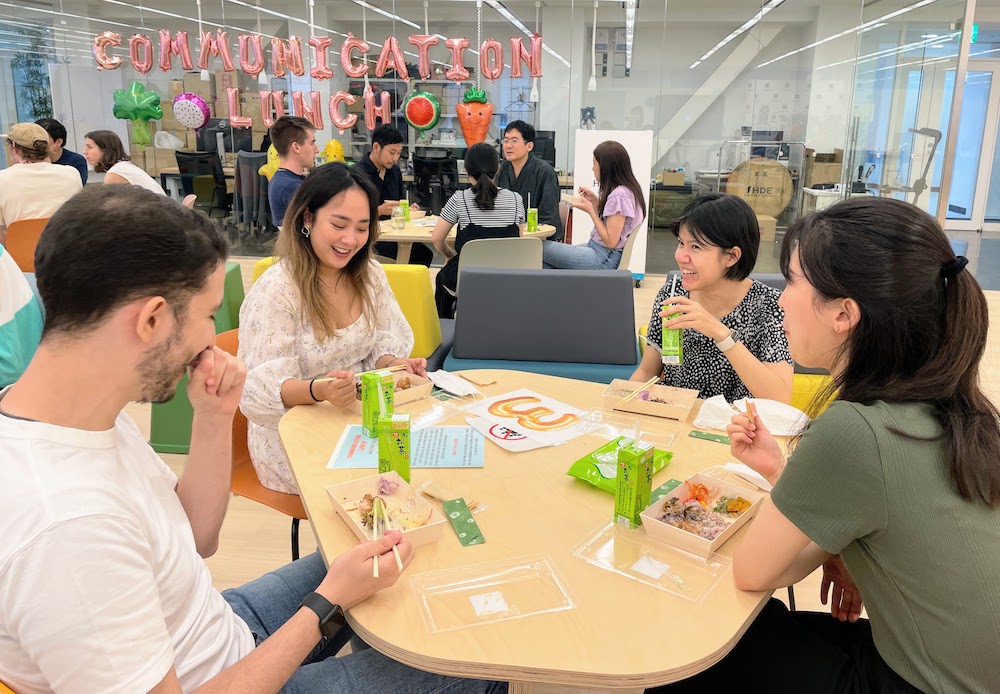

Finally, what kind of people are HENNGE looking for?

What is often expected of venture companies is a charismatic manager telling people to do this or do that, but at our company, people are proactive and work on their own. Everyone really learns a lot. I think that people who enjoy change and challenges are suited to HENNGE.

I feel like people who like to take on challenges have a certain type. I think it’s either people who can talk deeply about “what they like” outside of business fields, or people who are deeply involved in some genre. Because they have two different axes (*) like that, there are a variety of perspectives that things can be seen from. When I communicate with people like that, I really enjoy making new discoveries.
(*) two different axes: The first axis refers to the professional career, or the business aspect of an individual. The other axis refers to personal hobbies or something outside of work that the person is deeply interested in.

In this industry, knowledge becomes obsolete after a few years. That is why it is important to be able to enjoy new things. It is also important to have a habit of being curious about differences and discovering new things every day, while respecting differences with others.This goes along with the mission of HENNGE, which is to create innovation out of diversity and to create new value while increasing labor productivity. We believe that our continued change (HENNGE) will continue to change society as a whole.
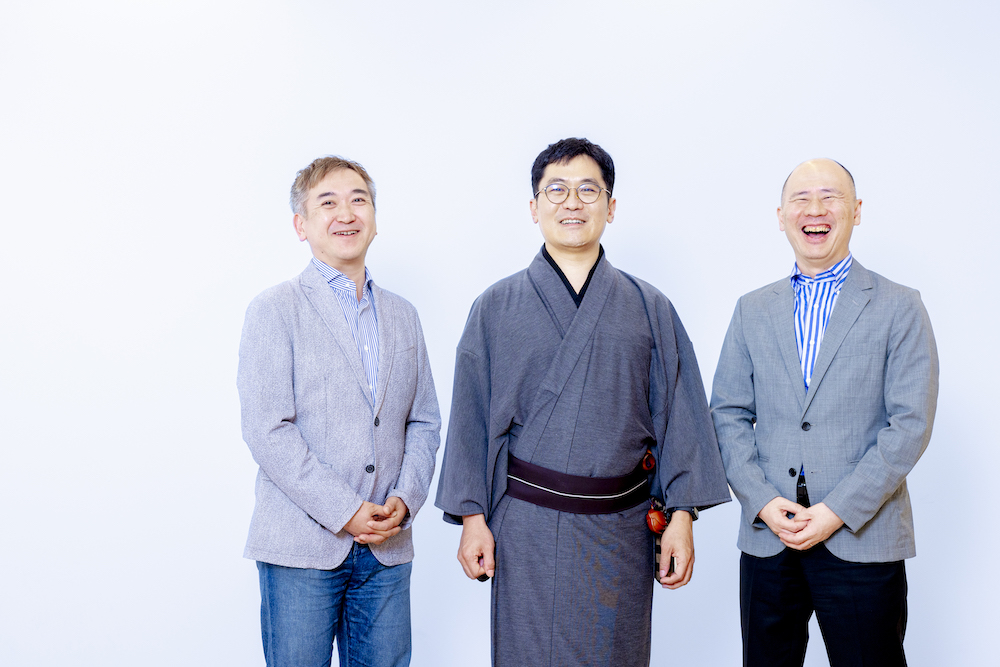

Thank you very much for your time!

MASAKO YANO
Published on Aug 1, 2023
Hello! I am looking forward to working with you today. Let’s dive right in! First, what kind of childhood and school days did the three of you have?